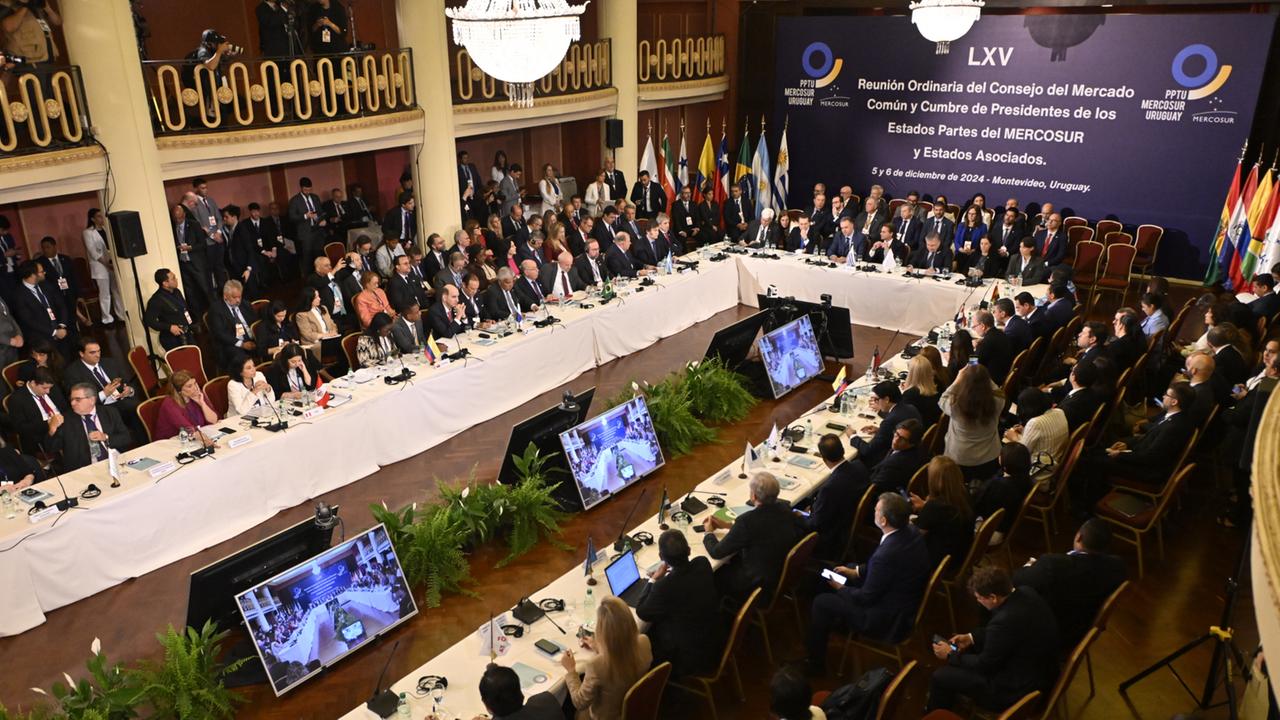faq
The agreement between the EU and the Mercosur states creates the largest free trade area in the world – affecting more than 700 million people. Which countries and sectors will the pact benefit the most? Who criticizes?
What does the EU hope for from this? Free trade agreement?
With the free trade agreement, the EU is essentially pursuing an economic and geostrategic goal. On the one hand, it is about advantages for the domestic industry, as European companies sell their products more cheaply in the Mercosur countries or benefit from imports from South American countries. On the other hand, it is about becoming more independent from China and the USA and establishing better trade connections with other regions of the world.
What makes the pact so interesting for the EU?
More than 260 million people live in the four Mercosur countries (Argentina, Brazil, Paraguay and Uruguay). Together they form the fifth largest economic region in the world with an annual gross domestic product of 2.2 trillion euros. Last year they imported goods from the EU worth 55.7 billion euros, while the export volume in the opposite direction was 53.7 billion euros. According to EU figures, a total of 60,500 European companies could benefit.
How big would they be? economic Effects?
In a review of various studies, the German Economic Institute (IW) comes to the conclusion that the overall economic effects are likely to be rather small. In the EU, GDP could grow by just 0.06 percent between 2024 and 2040 – that would correspond to just around 11.3 billion US dollars. The biggest beneficiary would be Brazil with 0.46 percent GDP growth, which would be equivalent to $9.3 billion. These figures were calculated using the Global Trade Analysis Project (GTAP). Other studies also came to figures of a similar magnitude, according to the IW.
Which sectors of the economy could particularly benefit?
The industry in particular is hoping for good business. German car manufacturers, for example, have long been pushing for a Mercosur free trade agreement. So far they have been paying 35 percent tariffs for car exports to the Mercosur countries. This resulted in only 20,700 cars being exported from Germany to Argentina and Brazil in the entire year of 2023, according to the Association of the Automotive Industry (VDA). There are also high tariffs on car parts.
Food manufacturers could also benefit from the agreement. Chocolate and confectionery (20 percent), wine (27 percent), spirits (20 to 35 percent) and soft drinks (20 to 35 percent) have also been subject to high tariffs.
European farmers warn – why?
Europe's farmers are afraid of cheap competition from South America. Labor costs there are significantly lower. Joachim Rukwied, President of the German Farmers' Association, warned: “The Mercosur agreement would lead to domestic production being displaced by agricultural imports to standards from the last century, to the detriment of consumers, farmers, animals, the environment and the climate.” Another concern: lower environmental standards in Mercosur countries.
What's wrong with the farmers' criticism?
The agreement attempts to address criticism by containing protection mechanisms for so-called sensitive agricultural products. For example, in the case of beef, where the import volume is to be limited to 99,000 tons at a low tariff rate of 7.5 percent.
That's not enough for the farmers. They emphasized that the quota for the reduced tariff rate would cover around half of all current beef imports into the EU. In a calculation of the impact on the agricultural industry, the Thünen Institute also came to the conclusion that EU production would decline slightly. However: The decline is a maximum of one percent across sectors, according to the study. The pork and poultry meat industry would be most affected.
Why do environmentalists criticize this? Free trade agreement?
They fear that the new sales opportunities for agricultural products could fuel environmental destruction, for example in the Amazon rainforest. The environmental organization Greenpeace assumes that deforestation rates in the Mercosur region will increase by five percent per year over the next six years due to higher import quotas for beef. Decreasing tariffs on pesticides and plastics could increase plastic pollution in South America and endanger biodiversity.
How do the EU and Federal Government to the criticism?
They reject most of the allegations as unjustified and emphasize that the overall economic benefits clearly outweigh the negatives. On the subject of pesticide use, the Federal Ministry of Economics explains that all imports must continue to comply with the legal requirements of the European Union. This means that the maximum residue levels applicable in the EU must not be exceeded. In general, only products that comply with extensive European regulations may be imported into the EU.
France and Italy are against the agreement. Can it take effect against their opposition?
Actually not. Since the agreement contains not only trade agreements but also agreements on political dialogue and cooperation, it should actually be submitted to all member states for ratification. However, the EU Commission responsible for the negotiations could try to split the political part from the commercial part. The trade part could then be adopted by a majority vote by the Council of EU states and would only have to be submitted for approval to the European Parliament and not to national parliaments. However, it is unclear whether such an approach would pose legal risks.
When could the agreement be formally signed?
After the negotiations have been concluded, the negotiated text must be subjected to legal review and translated into all languages of the contracting states. A signing is therefore not expected until the second half of next year.




